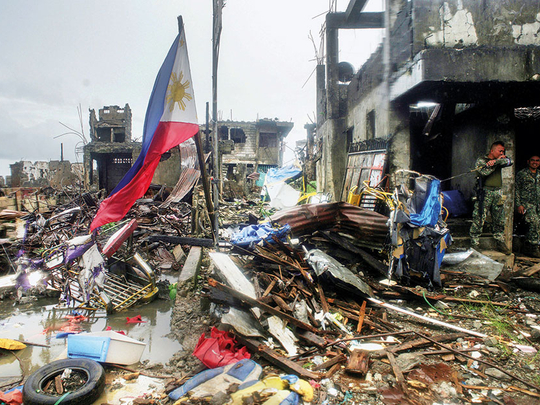
Manila: Citing continuing security threats, President Rodrigo Duterte has asked Congress to extend until December 2018 the state of martial law he declared last May 23 in Mindanao.
“I ask Congress to further extend the proclamation of martial law and suspension of the privilege of the writ of habeas corpus in the whole of Mindanao for a period of one year from January 1, 2018 to December 31, 2018,” Duterte said in a letter to the Senate and House of Representatives dated December 8.
Duterte placed the entire southern main island of Mindanao under martial law on May 23 amid an uprising in Marawi City by Daesh-inspired militants, led by the brothers Omarkhayam and Abdullah Maute, as well as Abu Sayyaf leader Isnilon Hapilon. The instigators of the incident were supported by militants from Malaysia, Indonesia and other countries.
In late October, government forces were able to neutralise the Maute brothers and Hapilon as well as 920 of their followers. Some 139 were arrested and 61 criminally charged.
Despite this, the President said the threat from extremists and other groups intent on sowing terror, remain.
“On December 4, I received a letter from Defence Secretary Delfin Lorenzana saying that he is recommending the extension of martial law for another 12 months covering the whole of Mindanao primarily to ensure the total eradication of the Daesh-inspired Da’awatul Islamiyah Wailayatul Masriq (DIWM), other like-minded foreign and local terrorist groups and their supporters,” Duterte said.
He added that based on an assessment by the security services, threats to security and peace remain.
“First, despite the death of Hapilon and the Maute brothers, remnants of their group continue to rebuild their organisation through recruitment and training of new members … Second, the Turaifie Group [a militant organisation led by Esmail Shaikh Abdul Malik, alias Abu Turaifie)] has likewise been monitored to be planning bombings in the Cotabato area. Third, the Bangsamoro Islamic Freedom Fighters continues to defy government … Fourth, remnants of the Abu Sayyaf in Basilan, Sulu, Tawi-Tawi and Zamboanga Peninsula remain a serious concern…”
“Last, but certainly not the least, other local terrorist groups such as the New Peoples’ Army took advantage of the situation and intensified their decades-long rebelling against the government and stepped up terrorist acts against innocent civilians and private entities,” Duterte said.
Martial law in Mindanao, as declared by Duterte, had already been extended as the Constitution prescribes a three-month limit from declaration until Congress (Senate and House) could entertain another request for an extension. The President said an extension until December 31, 2018 is necessary, “to quell ongoing rebellion in Mindanao and prevent its escalation to other parts of the country”.
According to reports, the Senate and House could hold a joint session to tackle the extension of martial law before Congress goes on recess for the holidays.
Senate Minority Leader Franklin Drilon strongly opposed the second extension of martial law Mindanao, as he said that such a move would be “unconstitutional.”
He added the recommendation of the Armed Forces of the Philippines (AFP) and the Philippine National Police (PNP) “has no factual and legal basis and is patently unconstitutional”.
“There is no legal basis for the AFP and PNP to recommend an extension of martial law in Mindanao,” Drilon said.
“We cannot continuously place Mindanao under martial law and suspend the privilege of the writ without an actual rebellion in the region,” Drilon said.
“The Constitution requires the existence of actual rebellion or actual invasion,” Drilon said.












